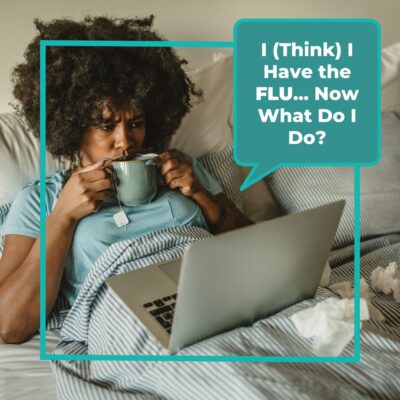
- Flu Facts
- Flu Prevention
I (Think) I Have the Flu…Now What Do I Do?

It has happened to most of us; we are enjoying a get-together with family and/or friends, and a few days later, we get the dreaded text…someone has the flu. You have been exposed to influenza, so now what? How long do I wait for symptoms? When do I test? What happens if I test positive? So many questions, but not to worry, we have you covered! We recommend the following if you are exposed to the flu (or feel like you may be coming down with something).
If you’re not currently experiencing symptoms, get the flu vaccine: The annual flu vaccine is the best way to prevent becoming sick with the flu. This will give you the best opportunity to avoid the flu (or the severity of it) this season.
If you are exposed, flu symptoms may start suddenly (unlike colds). Symptoms appear about one to four days after a person is exposed to the flu. It is best to wear a mask during this time to avoid potential spread to others. Look for symptoms like fatigue, fever, chills, a cough or sore throat, a runny or stuffy nose, headache and muscle aches. You may also experience nausea, vomiting, or diarrhea (most common in children).
If you start to experience symptoms, test. Contact your medical professional or visit your local urgent care and ask for a flu test as soon as possible. This way, if you do test positive, you can start an antiviral medication to lessen symptoms and potentially shorten the contagious period. Remember, you are most contagious from 24 hours before symptoms start until at least three to five days into the illness. If you need to be around other people, it is imperative that you wear a mask to protect others around you.
Important note! If you test negative for the flu, ask for other tests to rule out COVID and RSV. If you have symptoms of something, it is best to rule out as many illnesses as possible to find the best treatment options and to protect those around you by identifying what you have.
While you are sick, begin an antiviral medication (if a medical professional prescribes it). Get plenty of rest, stay hydrated, and take fever-reducing medications if your doctor recommends them. Keep your hands washed and disinfect your living space as much as possible to avoid spreading your germs. Also, avoid going out if possible and if you must be in public, make sure to wear a mask.
Even if you are starting to feel better, stay home. The flu can be contagious before symptoms start and the flu is still contageous up to 10 days after you begin to feel ill. It is best to stay home and continue to wear a mask around others until you are symptom-free.
It’s not too late to vaccinate! If you have not received your flu vaccination yet, it is not too late! Check with your doctor or local pharmacy to schedule. This is the best way to protect yourself and those around you!


